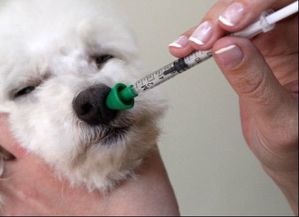
- Kennel Cough
Bordetella bronchiseptica is a bacterium which is species specific (i.e. the bacterial species appear to affect only a single mammalian species). In people Bordetella bacterium causes whooping cough and pertussis vaccine is given to protect against this. In the past in dogs, this was known as kennel cough as it is a highly contagious disease and so passed from dog to dog in close contact. In fact kennel cough or more accurately coughs caught in kennels in dogs are caused by a range of viruses and bacteria. Just as children going to school/nursery can still catch coughs and colds.
The most serious causes of infectious coughs in dogs are the bacteriumBordetella bronchiseptica as this can lead to severe symptoms and remain infectious for up to 3 months.
How is it spread - When an infected dog coughs or sneezes, pathogens are transmitted through the air which may then infect other dogs.
It can also be spread through contact with contaminated surfaces such as the ground, toys and bowls and also through direct contact when your dog comes nose to nose with an infected dog.
Where can my dog catch it?
‘Kennel Cough’ is a term often used to describe the disease but this can be highly misleading as Bordetella is a disease that is not exclusive to dogs that have been in boarding kennels.
Training/socialisation classes, animal shelters, grooming parlours, dog shows, beaches and large public parks are just a few of the common places that your dog may socialise with other dogs and contract the disease.
Your dog may be at risk of contracting the disease when they go anywhere an infected dog may be. So even if your dog hasn’t gone to kennels over the summer they may catch it when they socialise on their walk especially in the summer time.
What are the symptoms?
Symptoms of kennel cough typically begin 2-14 days after exposure. This means that your dog may start showing signs of the disease 2 weeks after they were actually infected with it.
The disease can remain in the system for up to 3 weeks but in severe cases can last longer and progress on to pneumonia.
Even after symptoms of Bordetella disappear, your pet may remain contagious for days or even weeks later. The disease can also return if your dog suffers from stress; an animal’s immune system, just like ours, can become compromised with stress.
Symptoms of kennel cough include:
- a harsh, dry, hacking cough
- retching
- Sneezing
- Snorting
- Gagging
- Vomiting
- a lack of appetite
- lethargy
- fever
Most dog owners have reported that the cough sounds as though their pet has something stuck in their throat and is choking.
Am I at risk?
It is highly unlikely that bordetella bronchiseptica can be caught by people. In fact due to how hard it is to cross the species barrier the dog vaccine is made from the pig strain of the bacterium. However, one recent scientific study now supports the idea that ‘kennel cough’ is a zoonotic disease. This means that it can be transferred from animal to human and vice versa. This is because the Bordetella bronchiseptica bacterium, which can cause ‘kennel cough’ is related to the bacterium that causes whooping cough in people and can affect those with compromised immune systems ( Berkowitz, et al.,2007).
Bordetella has been cultured in patients with compromised immune systems. It is advised that people with weakened immune systems should exercise caution around coughing dogs.
Protection and Vaccination
It is strongly recommend vaccination against Bordetella bronchiseptica which is known as the kennel cough vaccine. This vaccine is given as drops up the nose and does not contain any adjuvants to irritate the immune system and heighten response. It is recommended for all social dogs (not just those due to board in kennels) due to the highly contagious nature of the disease, which affects many dogs in many scenarios.
When people receive their flu vaccine, they are not exempt from catching coughs, colds and mild flu strains. Dogs are just the same. Your dog may still catch a cough or cold but fortunately, they will be protected against the severe strain of Bordetella once they have received their vaccine.
The vaccination is given intra-nasally which involves administering a small amount of liquid up your dog’s nose. This is quick, painless and provides fast, effective immunity. Vaccination should be kept up to date yearly to ensure your dog has constant protection in all situations and environments.
If you think your dog has kennel cough
If you are worried that your dog may have kennel cough then please contact your veterinary surgery to book an appointment you will need to keep your dog in the car, unless otherwise advised by the vet, as the dog will need to be isolated. A vet will be happy to give your dog a full health check and rule out any other possible causes of the symptoms being displayed as well as provide any treatment your pet may need to help them feel more comfortable and make a full recovery.

